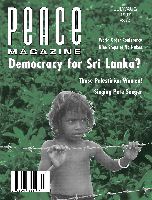
Peace Magazine Jul-Aug 1997, page 31. Some rights reserved.
Search for other articles by Shirley Farlinger here
Newton Bowles, former UNICEF official, is serious about his sixth annual round-up of the machinations of the United Nations but he manages to add his own whimsical touch. His report is written for The Group of 78 and the United Nations Association (Canada) but his work deserves a wider audience.
"The fifty-first session of the General Assembly was suffused with apprehension and apathy...and the money crunch was numbing," he writes. Bright spots were the decision to move ahead with a permanent International Criminal Court, a study on the impact of armed conflict on children, the ratification by 155 nations of the Climate Convention and the signing of the Comprehensive Test Ban Treaty after a "Nukeless vs. the Nukers" debate.
As for the new Secretary-General, Kofi Annan, Bowles postulates "if he is permitted, and if the U.S. funds come through, he can surely steer a happy course. His integrity and strength bring out the best."
Bowles says Canada stands in high regard as a mediator and negotiator and as a country committed to peacekeeping, human rights and the International Criminal Court, but it is not a leader in terms of nuclear disarmament.
The 51st General Assembly had an agenda of 155 items, six committees of the WHO, and many reports, a heavy workload made more difficult by the U.S. elections.
"With Russia on the ropes pro tem, the U.S. is cock of the barnyard," he writes. "The Russian bear hibernates but American political paranoia lives on, in search of enemies."
Canada's Maurice Strong is Executive Coordinator of U.S. reform: "the symphony of the day" notes Bowles. Five working groups have been at it for three years and must finish by July. "What penalty (if they do not) stalks in the U.S. rose garden?"
The theme was that the United States is at a crossroads. "Why do we continue to fail in overcoming the narrow boundaries of national interests?" asks Ambassador Razali of Malaysia, President of the General Assembly. "All of us need a strong United Nations," he tells a Washington audience, "not because we agree on everything but because we do not."
Bowles uncovers the role of the U.S. in the Balkans, claiming that NATO replaced the U.N. but then put in the same agreements that the U.N. had previously arranged. Even after the U.N. withdrew from the former Yugoslavia, there were still 25,000 personnel from 69 countries in 16 operations at a cost of $1.8 billion in 1996.
Other topics covered are land mines, the U.N. Register of Conventional Weapons, a possible UNSSOD IV (U.N. Special Session on Disarmament), and human rights. "Will [Annan] use his authority to integrate human rights across the board in all U.N. peacekeeping, humanitarian and development operations?...Go for it, Kofi!"
In the development arena, "there is a common focus on people, making life better, as the purpose and goal of development." However, he notes that "trade agreements are mainly among industrializing countries, leaving import barriers against primary products from the poorest countries...No one seems to know how to harness the mighty steeds of private industry to serve need, not greed." But "the U.N. system still delivered about $6 billion in aid last year...As the Security Council stumbles over preventing or stopping conflict, humanitarian aid goes on." The number uprooted is about 26 million; next year is the U.N.'s Year of Uprooted Peoples.
To cover the General Assembly debate, Bowles gives excerpts from 25 speeches out of a possible 181. (Four countries were quiet.) I enjoyed his choice with plenty of uplifting bon mots and pointed criticism of the $1.5 billion debt the U.S. owes while the U.N. benefits New York city alone by $3.2 billion a year.
The annexes to the report are very valuable: facts about the cost and size of the U.N. ($1.3 billion and 53,333 people); a statement by 16 heads of state including Canada's on comprehensive U.N. reform; a Statement on Nuclear Weapons by International Generals and Admirals, 19 from the U.S.; the Paul Lecture by Oscar Arias on the arms trade, the peace dividend, and disarmament; an appeal by the Canadian, Dutch, and Danish ministers on making U.N. peacekeeping work, the Secretary General's two-track reform program; and the membership of the General Assembly, the Security Council, the Economic and Social Council and the International Court of Justice.
All in all it was a dedicated reporting of the 1996 U.N. effort to bring sanity to this confusing world. To order a copy call The Group of 78, Ottawa, Ontario, 613/230-0860.
Reviewed by Shirley Farlinger, a Toronto writer and activist.

Peace Magazine Jul-Aug 1997, page 31. Some rights reserved.
Search for other articles by Shirley Farlinger here